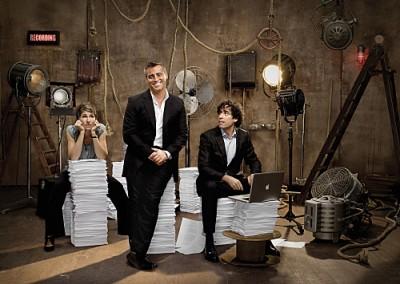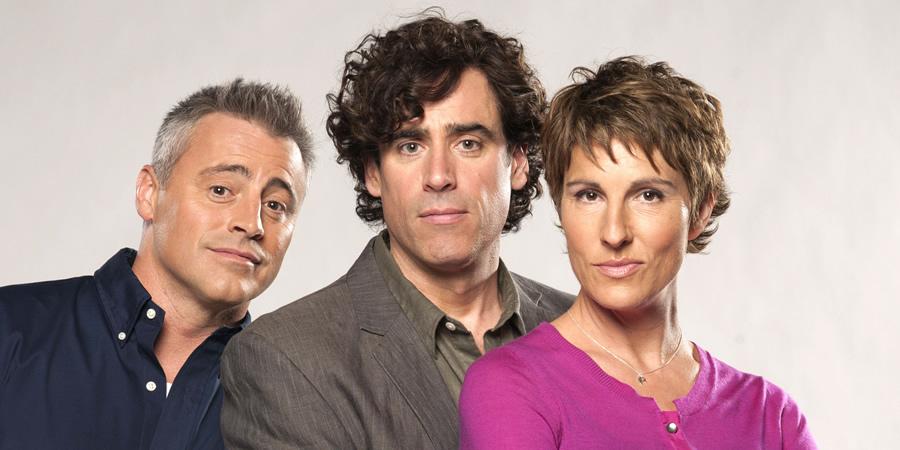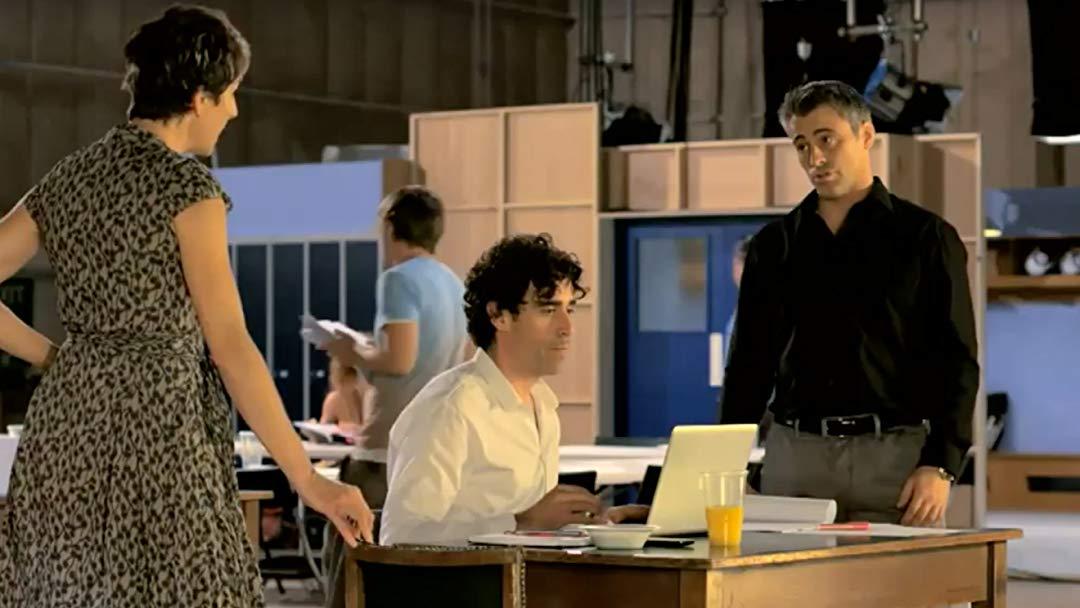And the award for “Most Awkward TV Show Title” goes to…..drum roll please…Showtime’s Episodes!
(Puzzled stare)
Oh, I see the confusion. Showtime, you see, is the name of the network that aired the show in the States. It was actually on the BBC Two in the UK.
(That wasn’t the confusing part)
Right. Gotcha. So, Episodes is the name of the show.
(I get that it has episodes. All TV shows do, but what’s it called?)
Episodes.
(Look, let’s not do the whole “who’s on first, what’s on second” routine here, Abbott & Costello boy. We’re going through a pandemic here, and I can’t find any toilet paper! I just need a good recommendation for something to watch before I go crazy. So, please, for the love of … whoever you pray to … just tell me the name of the damn show!)
Episodes. That is the name of the show. Feel like that’s not nearly as confusing as we’re pretending it is.
(And how many episodes does Episodes have?)
You see, now that’s when it starts to sound confusing.

And if you enjoyed that bit of vaudeville riffing you might dig Episodes – which ran from 2011 to 2017. The show’s jokes are better than mine, though. I swear. No awkward Abbott & Costello routines; mostly, 90s sitcom tropes updated for today.
Pulling back for a moment, during this early stage of the global COVID-19 quarantine I’ve seen a lot of entertainment recommendations for classic movies to watch, kick-ass sci-fi shows to catch up on, and compelling dramas to finally get around to. I’m just not in that headspace yet. Right now, when I have time for entertainment I want comfort food TV, and for me that often means sitcoms, though I long ago reached my personal limit for Cheers, Friends, Seinfeld, and How I Met Your Mother rewatches. I struggle with laugh tracks these days.
So, I ended up at Curb Your Enthusiasm, and when I needed a break from Larry David’s misanthropic adventures I was drawn to Episodes, another showbiz satire about famous people being…well, kind of awful.
The Backstory

David Crane and Jeffrey Klarik are 90s sitcom veterans. Crane – along with Marta Kauffman – co-created a little show not a lot of people have heard of (note my sarcasm) called Friends. Klarik, meanwhile, was a Dream On staff-writer and Mad About You writer/co-producer in the first half of the decade. They have since become life partners as well as writing partners and, in 2011, pulled from their years in the entertainment industry trenches to co-create Episodes as a BBC/Showtime co-production.
The Premise

Two British writers – married couple Sean (Stephen Mangan) and Beverly (Tamsin Greig), loosely based on Crane and Klarik – decide, against their better judgement, to go for the money and port their hit BBC sitcom over to the States for a remake. They are promised creative control. Famous last words, amirite.
Pretty much the moment they touch foot in L.A. their show about a rotund, beloved, elderly primary school teacher turns into a broad comeback vehicle for Matt LeBlanc, who is more or less a smarter version of Joey Tribbianni IRL. It’s all downhill from there, with repeated run-ins with two-faced network executives Merc and his assistant/mistress Carol (John Pankow, Kathleen Rose-Perkins) and an actress, Morning Randolph (Mircea Monroe), who looks 30 but is so covered in make-up and plastic surgery that she’s secretly old enough to have worked with Bill Bixby.
Sample plot

When their sitcom is pulled from the network schedule but not canceled, everyone plots their next move. For Matt, that means wallowing in self-pity, for Sean and Beverly it means deciding if they’ll finally move back home or dust off one of their old scripts and shop it around Hollywood, and for Morning it mostly means making sure Matt stays away from her younger sister – especially since that younger sister is actually her daughter!
Wait, Why Did Two Americans Create a Show About Two Brits?

Given that Episodes arrived in the wake of/concurrent to such failed British-to-American TV remakes as Viva Laughlin, Coupling, Eleventh Hour, Life on Mars, Skins and The In-Betweeners, the time was ripe for a culture clash comedy about crass Americans getting a hold of some erudite Brits and wrestling them into submission. Why exactly David Crane and Jeffrey Klarik – two Americans – were the people to write that script, however, was an open question at the time. It’s not as if they had any first-hand experience with that from the British point of view.
True, but even with their 90s sitcom background they were still susceptible to the fickle whims of the American TV industry. Crane and Klarik really believed in a show they created for CBS called Class, but the network canceled it after one season. In a HuffPost interview, Klarik explained how that experience directly led to Episodes:
“I decided I didn’t ever want to do television again because nobody appreciated the hard work we did. We had a friend who had just come back from London who had done a show for the BBC. He said, ‘Oh my gosh, it’s like a dream come true. They don’t give you notes. They stay out of your way. They let you do exactly what you want to do.’ So, I said to David, ‘Okay, if we can do a show for the BBC where we don’t have to answer to a network, where we don’t have to bend to their whims, then I’ll do it. I’ll come back, and we’ll do it again.’”
The concept of two British writers coming to LA to remake their sitcom was invented as a way to do the series for the BBC but film it primarily in Los Angeles. Like Sean and Beverly, though, Crane and Klarik were in for a rude awakening. They had so little firsthand experience with producing British television they completely underestimated how small the budgets would be. The show about Brits in LA would have to be filmed in, well, the UK. Prior to the final season, David admitted, “For the last six years, we’ve been going to England for half a year and shooting it and trying to make it look as much like LA as possible.”
Not that anyone in the UK was particularly stunned. On-set photos weren’t hard to come by, the cast members were regulars on UK talk shows like Graham Norton, and the series was generally a much bigger deal over there than anywhere else. In the States, LeBlanc was continually nominated for a Golden Globe and/or Emmy, a nice feather in Showtime’s hat, but as The Village Voice put it: “When Matt LeBlanc won his first and only Golden Globe Award in 2012, for the Showtime comedy Episodes, the general reaction was a head-scratching, what the fuck is Episodes?”
It never rose above a niche hit, a favorite of people in Hollywood and of the Hollywood-obsessed (guilty as charged).

All cards on the table, a Brits vs. Yanks culture clash premise has plenty of potential for nuance, but on Episodes it’s mostly about how one group is pale and repressed and the other thinks William Shakespeare was that guy who fell in love with Gwyneth Paltrow in that one movie they never saw. You can sense the series is really the product of two sitcom vets trying to make themselves laugh with storylines lifted straight out of their own crazy Hollywood careers. TV critic Alan Sepinwall called it one of the worst things he watched in 2011. Other reviewers were far more charitable.
But it makes me laugh. Episodes, in the long run, steers harder toward showbiz satire than culture clash, and the characters fall into familiar sitcom archetypes – Matt as the oafish, id-indulging womanizer who’s still somehow insanely charming, Sean as his sometimes supportive, sometimes appalled, but always kind of vicariously living through him best friend, and Beverly as the extremely disapproving wife. Like most sitcom characters, they’re ultimately thinly-drawn but work well together as a comedy unit. As the UK’s Art Desk critic said of season 2:
“There were some very funny industry-related gags, not least network boss Merc and his PA-cum-mistress Carol having sex on his desk while roaring the ratings figures back at one another. The cast are excellent value but at the moment only Greig seems to be playing for genuine emotional stakes. Portraying an exaggerated version of his on-screen persona, LeBlanc’s sweet, sex-obsessed shallowness is all that’s required, but Mangan – a terrific comic actor – seems constantly to be toying with a smirk, devaluing some of the emotional currency you sense Episodes is striving for. Together, they’ve proved they can make us laugh.”
The later seasons where Matt transitions from acting into hosting an insane reality TV show pack a somewhat more surgical and emotional punch, but the jokes, as always, take center stage.
Recommended If You like
Friends, Curb Your Enthusiasm, BoJack Horseman, Showbiz comedies, 90s sitcoms updated for the 21st century, or just Matt LeBlanc playing a version of himself that is a marginally smarter, way more successful Joey Tribbianni
Appropriate for Family Viewing?
God no.
Streaming Availability
Netflix and Showtime in the States, according to ReelGood
Your Binge Totals
- 5 seasons
- 41 episodes
- Approximately 200 instances of Beverly rolling her eyes at Matt LeBlanc
- 10 jokes per season about how no one knows how old Morning really is since she’s had so much plastic surgery over the
yearsdecades - At least one scene where Matt LeBlanc has sex with a Friends superfan who makes him say “how you doin’?” at climax.
- 0 Friends reunion episodes but at least 1 guest star appearance from David Schwimmer


If you want hilarious comfort food TV, I recommend Black Books. Not sure how well the “Britishness” will translate, but it also stars Tamsin Greig…
For a very long time, the only British sitcoms I’d ever seen were Are You Being Served?, Mr. Bean, and a couple of Monty Python sketches. Then, with the encouragement of my anglophile best friend, I took the plunge into Spaced, Blackadder, Jeeves & Wooster, Coupling, Fawlty Towers, The Inbetweeners, The IT Crowd, and various others. There is an inescapable “Britishness,” as you said, for sure. There are also differences in production styles that I struggled with. Chiefly, so many British sitcoms teeter back and forth multiple times per episode between scenes filmed on a soundstage with 3 cameras and those on location with a single camera, yet they never let up on the laugh track. A lifetime of American sitcom watching where a studio audience could theoretically be providing the laugh track – even though the track is usually canned and not recorded from the actual studio audience – helps you to just go with it. But every time a British sitcom has a scene on location and a laugh track I always wonder, “Who the hell is laughing? There’s no one there other than the characters.” It’s a small thing, I suppose, one you can get used to, but I struggled to adjust.
That’s my great burden to bear 🙂
That all being said, I appreciate your suggestion. I watched the first episode of Black Books at the tail end of my British sitcom binging years ago, and I think I was just a little maxed out at that point. I don’t have a real memory of Black Books other than the laugh track thing and a box cover image of Dylan Moran in a black coat. I had never made the connection to Tamsin Greig. Looking at the Black Books pictures online now, I barely even recognizer her as the same woman from Episodes. Still got that same short hair, though, God love her. Watching the pilot on YouTube right now. Holy cow, a young Martin Freeman pops up as a doctor near the end, and, yes, it is very British.
There is no point in me even trying to deny the quirky, Britishness of it all. Yes, laugh tracks really grate on me these days, although I never really used to notice them when I was younger. There are quite a few surprising cameos sprinkled through that made me stop and go “wait, is that them from…?”. It’s all completely bonkers of course, but I’m not sure there is anyone who hasn’t contemplated breaking their own arm to avoid doing their taxes…